Sharkwater Blu-ray Movie
HomeSharkwater Blu-ray Movie 
Warner Bros. | 2006 | 89 min | Rated PG | Apr 08, 2008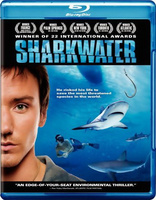
Movie rating
7.5 | / 10 |
Blu-ray rating
| Users | 4.7 | |
| Reviewer | 3.5 | |
| Overall | 3.8 |
Overview
Sharkwater (2006)
A reasoned defense of sharks' place in our ecosystem and a horrifying illustration of what is befalling them around the world. It is revealed that shark attacks are few and far between. And even when they do occur, wounds tend to be superficial. As it turns out, sharks happen to be the ocean's most important predator, the top of the food chain; their presence is ecologically vital to maintaining the sea's balance. And on this level, sharks — and humans as well — are facing environmental catastrophe.
Starring: Rob Stewart (IX)Director: Rob Stewart (IX)
| Documentary | Uncertain |
| Nature | Uncertain |
Specifications
Video
Video codec: MPEG-2
Video resolution: 1080p
Aspect ratio: 1.85:1
Audio
English: Dolby Digital 5.1
French: Dolby Digital 5.1
English: Dolby Digital 2.0
French: Dolby Digital 2.0
Subtitles
English, English SDH, French
Discs
25GB Blu-ray Disc
Single disc (1 BD)
Playback
Region free
Review
Rating summary
| Movie | 4.5 | |
| Video | 3.0 | |
| Audio | 3.0 | |
| Extras | 3.0 | |
| Overall | 3.5 |
Sharkwater Blu-ray Movie Review
Truly stirring and educational, this documentary is all the more improved on high definition.
Reviewed by Lindsay Mayer July 11, 2008Sharkwater is that type of documentary that demands a much greater awareness than what it has managed to command. A longing for less ignorance of the film's subject matter is felt upon finishing, and on a personal level, leads to further pensive moments about the current condition of life on our planet as a whole, and what potential the future may still hold.
The film begins with amateur filmmaker Rob Stewart's thoughts on sharks, the much maligned and commonly feared marine predator. A biologist and underwater photographer, Stewart has a bit of a Keanu Reeves vibe about him, though his extensive knowledge and passion for sharks is clear from the outset. "You're told your whole life, since you're a kid – sharks are dangerous. You're warned about venturing too far into the ocean. But then, finally, you're underwater, and you see the thing you're taught to fear, and it's perfect. And it doesn't want to hurt you, and it's the most beautiful thing you've ever seen. And your whole world changes."
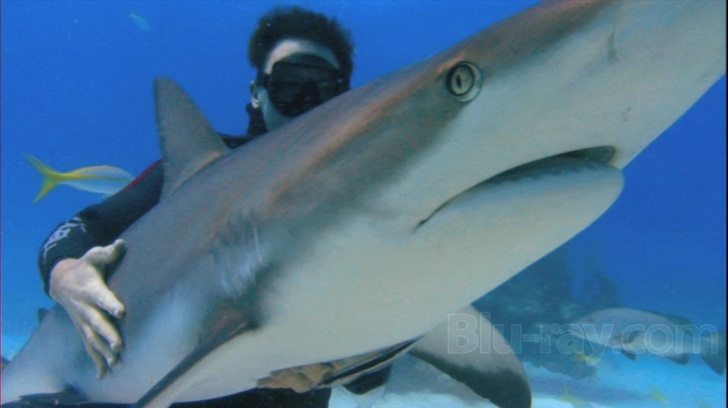
Biologist and photographer Rob Stewart embraces a Blacktip Shark as it swims by.
Sharks have remained largely unchanged for 450 million years. Their basic structure, behavior, and role as a predator make them one of the most ancient and integral parts of life on Earth. They have shaped the biodiversity and instincts of the world's marine creatures, and as a top predator, they are critical for maintaining balance across ecosystems. As an example, with less sharks around to control populations of fish and other prey who feed upon phytoplankton - a plant-based microscopic life form responsible for producing 70% of the planet's oxygen - the resulting reduction in phytoplankton populations could have untold ramifications for all aerobic organisms on Earth.
The fear-mongering portrayal of sharks in mainstream media, via anything from news reports to iconic monster films like Jaws, has helped to foster a deep sense of hate and paranoia from the public at large. Sharks are in fact shy creatures, and the majority of bites occur because of exploratory behavior; sharks use their mouths as tools of curiosity, and most result in superficial wounds with no flesh torn away. An average of 5 people a year die from shark encounters, and the vast majority of deaths are caused from blood loss rather than a shark consuming a human.
Rob Stewart initially set out to produce an educational and demystifying shark documentary of his own, capturing footage of sharks with high definition underwater cameras. He soon unwittingly became enmeshed in an international crisis. Stewart noticed far fewer sharks in several locations he had dived and explored before; when he returned with cameras in tow, he found little to film. Even havens like Cocos Island west of Costa Rica, or the protected archipelago of the Galápagos, revealed significant decreases in shark populations. On his visit to the latter, Stewart caught a boat throwing out longlines, a commercial fishing practice prohibited in the Galápagos. Stewart's presence scared the boat's crew away, and subsequent hours were spent towing in the miles-long line they had left in their wake. Hundreds of dead sharks, who took the baited hooks, entangled in the lines, and drowned, were pulled aboard the deck of Stewart's boat. He now knew why so many sharks went missing so alarmingly fast.
Sharks were being slaughtered by the millions, primarily for one purpose alone - shark fin soup. A Chinese delicacy that was, until recently, reserved only for high classes and nobility. A small portion of dried shark fin is added to a broth flavored with pork, chicken, or beef. It adds no flavor or texture to the dish - it is consumed purely for its perceived medicinal properties. As a shark is believed to never become sick, it is thought that the fish will bestow greater health and vigor upon consumption. As with most traditional Chinese medicine, however, this perception is completely false, and has resulted in dozens of endangered or extinct species. The demand for shark fin soup is so great, and there is so much money to be had in the practice, that only drug trafficking rivals the finning trade in sheer scale.
The skewed perception of sharks as ruthless killers that has led to widespread apathy about their protection. Their is no international law which controls the harvest of sharks, and this fact, compounded with the profits garnered from the demand for shark fins in Chinese cuisine and medicine, have resulted in an unchecked massacre. An estimated 100 million sharks are killed annually for the finning trade. The process itself is incredibly barbaric and wasteful; live sharks are hauled aboard ships with long hooks, their pectoral, dorsal, and tail fins are sliced off, and the body is thrown overboard. The immobile, finless sharks then slowly drown. The slaughter of whole sharks for nothing more than a handful of fins is a sickening practice, and akin to the poaching of elephants for nothing more than their ivory tusks. Unfortunately, no one is protecting the sharks.
Stewart soon allies himself with Paul Watson and the Sea Shepherd Conservation Society, a renegade force that takes an offensive approach in environmental and species protection. Notorious for their aggressive seaborne confrontations with everything from fishing boats to hulking whaler ships, Watson and the SSCS have been patrolling the oceans for 30 years. Watson, Stewart, and the SSCS head south for Cocos and Galápagos, determined to protect the areas from finning raiders. What follows is a dramatic and revealing journey into mafias, black markets, and corrupt governments. Costa Rica threatened the SSCS with arrest and prosecution due to their ties with the Taiwanese mafia using the country and its ports to process and ship shark fins to Asia. The Galápagos quickly became a lost cause as well, when the government legalized longlining soon after the SSCS' arrival.
After narrowly escaping the Costa Rican authorities, Stewart decides to make an attempt at visiting Cocos Island once more. He fully expects to be persecuted upon entering the country, knowing he is a wanted man. Instead, Stewart comes upon an astonishing sight - an outraged Costa Rican public demonstrating in the streets to rid their country of the shark finning trade and end the corruption. The Sea Shepherd's arrest had forced a spotlight on the black market, and the people of Costa Rica wanted no part of it. Only fitting, for a nation known for its eco-tourism. Stewart notes that no hide nor hair can be found of the Taiwanese mafia upon his return to the country.
In the end, Stewart finally visits Cocos and swims with reef sharks, getting some beautiful shots in the process. He reflects on his experiences and finishes on positive notes, such as the Galápagos government rescinding its decision on longlining, making their waters a sanctuary once more. He urges action from the viewers, citing facts and figures and pointing the audience towards contacts to become involved. International bans on whaling occurred in the 1980's due to the amount of public outcry. One can only hope that sharks will ever be as lucky.
Sharkwater Blu-ray Movie, Video Quality 
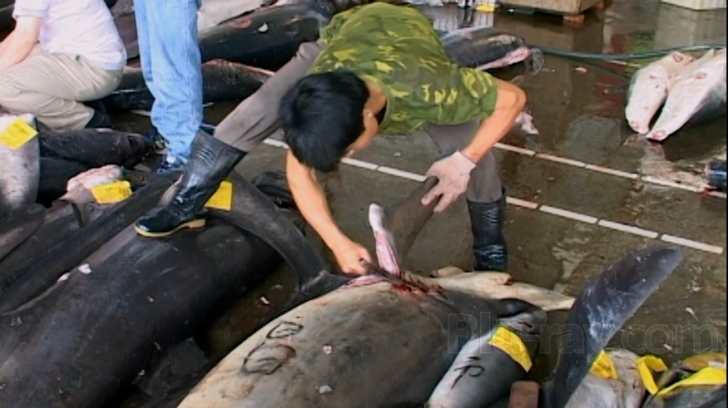
Presented with 1080p/60Hz MPEG-2 video, Sharkwater contains some great underwater footage, filmed as it was with HD cameras. The very nature of marine filming does not allow for sharp-as-a-tack high definition picture because - well - it's under water. Subjects naturally have a soft look to them, but they are nonetheless visually striking on this title. The surreal, vivid colors of tropical reefs pop off the screen, and details like the sheen of scales are well-preserved. Macroblocking and color banding are in thankfully short supply here, and given the monochromatic blue scenery of most open ocean shots, this is a good thing indeed.
The documentary is also interspersed with low resolution footage from undercover cameras, news outlets, and the like. Though frustrating when such footage appears onscreen, the subject matter of the film makes the use of it tolerable; after all, filming illegal activity would be rather difficult to come across with current HD technology! The balance of high definition camerawork with standard definition footage to illustrate a point is entirely understandable on Sharkwater.
Sharkwater Blu-ray Movie, Audio Quality 
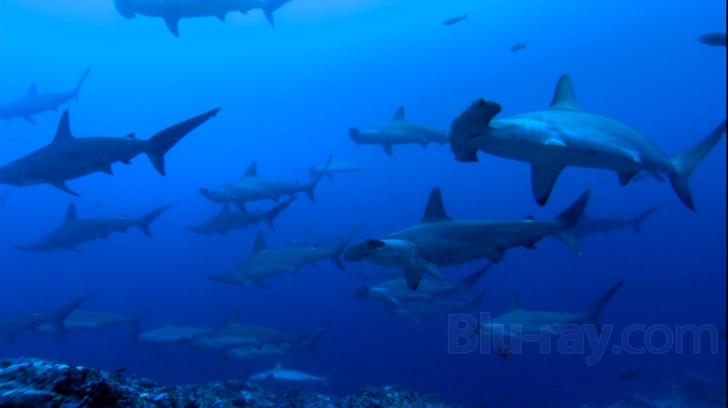
Again serving a more functional purpose than an entertaining one, Sharkwater comes in English Dolby Digital 5.1 and 2.0, as well as French Dolby Digital 5.1 and 2.0. The lack of lossless audio on a title like this is not much of a loss, as its primary purpose is to inform the viewer. Even unlike BBC productions as Planet Earth or Galápagos, the amount of candy for the senses in this film is limited. Though the visuals are pleasing, aural attributes of underwater films are none too thrilling. A long-running joke about films taking place in space is that, due to its cold vacuum of a void, sound waves cannot travel, and ergo - no sound can actually be heard in space. A similar effect happens with action under water - aside from the constant muted roar of the surf overhead, human ears cannot pick up a large range of sound when submerged. Camera footage is subsequently augmented with foleyed sound effects, and Stewart touches on this issue briefly in The Making of Sharkwater. As such, no interesting ambiance could really be achieved through a lossless codec, so the Dolby Digital options more than suffice.
Sharkwater Blu-ray Movie, Special Features and Extras 

Sharkwater comes with the standard handful of supplements - behind-the-scenes, promotional material, and a novelty or two. For successfully stirring viewers into action over the widespread problem of shark finning, the extra features prove to be a disappointment. No real follow-ups or extensive detailing of how to address the issue on an individual and national scale are offered on the disc, short of a passive "go to this website" listed at the end of the feature.
The most substantial piece in the extras is the Making of Sharkwater featurette, in which Stewart gives a bit of insight to task of getting the film underway. No one wanted to take a chance on an amateur filmmaker who wanted to make yet another documentary on sharks. Beginning in 2002, the project finally came back to Stewart after several years on secondary assignments. Other crew members reflect a bit on the filming experience, although there tends to be a portion of repeated material here from the film itself, so it gets rather tedious to watch after a while. The Naval training film Shark Defense, seen in snippets during the documentary, is available in its entirety here, as well. An archive piece from the 60s, the film paints sharks as bloodthirsty killers, and then illustrates several defensive tactics to take should one find themselves stranded in the open ocean. The reasoning behind some of the more bizarre methods is not even explained, and the film overall is somewhat amusing for its dated and sensational depiction of sharks. The Virtual Ocean is a 20-minute, 1080i loop of footage used in the documentary, with nothing but a soothing score running over it. It is indeed rather peaceful, though again, it is merely a novelty. Lastly, the theatrical trailer for the film, as well as three TV spots running consecutively, are provided.
Sharkwater Blu-ray Movie, Overall Score and Recommendation 
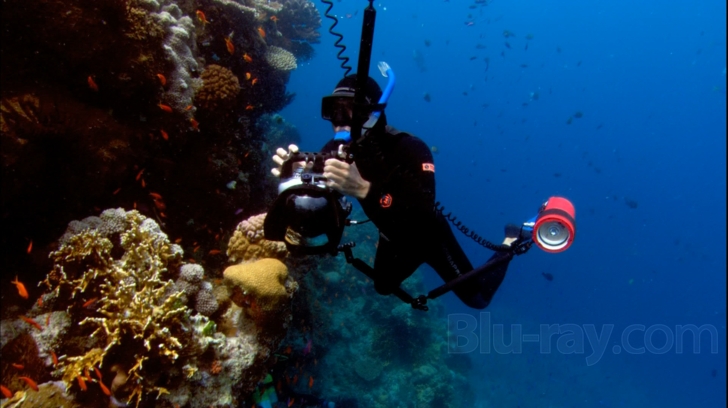
I cannot help but worry that Sharkwater will be yet another documentary that raises critical awareness of universally important issues, only to be shunted aside with little to no results to show from it. Such is the fickle consumer nature of the Average Joe, I suppose. Regardless, I highly recommend this title for its subject matter alone. The Blu-ray itself is a great presentation of magnificent underwater imagery, but it certainly is not a home theatre reference title by any means. Then again, documentaries almost never are. Sharkwater merits a rental at the very least - it is truly engrossing.
Similar titles
Similar titles you might also like

The Cove
2009

HOME
2009

An Inconvenient Truth
2006

Volcanoes of the Deep Sea
IMAX
2004

Wild Ocean
IMAX
2008

Grand Canyon Adventure: River at Risk 3D
IMAX 3D
2008

The Blue Planet: Seas of Life
2001

The Story of India
2007

Human Planet: The Complete Series
BBC
2011

Wild Pacific
2008

Nature's Most Amazing Events
2009

Galápagos
2006

Planet Ocean
2012

Wild China
2008

Arctic Tale
2007

Deadliest Catch: Season 3
2007

Frozen Planet
The Original UK Series
2011

Winged Migration
2001

Planet Earth
The Complete Series
2006

Coral Reef Adventure
IMAX
2003